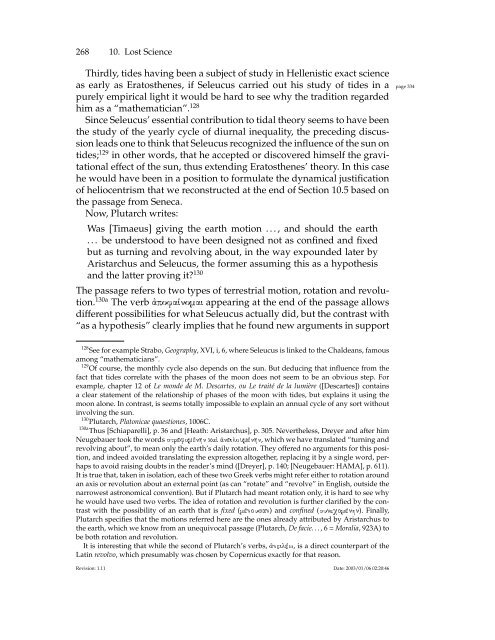1 The Birth of Science - MSRI
1 The Birth of Science - MSRI
1 The Birth of Science - MSRI
You also want an ePaper? Increase the reach of your titles
YUMPU automatically turns print PDFs into web optimized ePapers that Google loves.
268 10. Lost <strong>Science</strong><br />
Thirdly, tides having been a subject <strong>of</strong> study in Hellenistic exact science<br />
as early as Eratosthenes, if Seleucus carried out his study <strong>of</strong> tides in a page 334<br />
purely empirical light it would be hard to see why the tradition regarded<br />
him as a “mathematician”. 128<br />
Since Seleucus’ essential contribution to tidal theory seems to have been<br />
the study <strong>of</strong> the yearly cycle <strong>of</strong> diurnal inequality, the preceding discussion<br />
leads one to think that Seleucus recognized the influence <strong>of</strong> the sun on<br />
tides; 129 in other words, that he accepted or discovered himself the gravitational<br />
effect <strong>of</strong> the sun, thus extending Eratosthenes’ theory. In this case<br />
he would have been in a position to formulate the dynamical justification<br />
<strong>of</strong> heliocentrism that we reconstructed at the end <strong>of</strong> Section 10.5 based on<br />
the passage from Seneca.<br />
Now, Plutarch writes:<br />
Was [Timaeus] giving the earth motion . . . , and should the earth<br />
. . . be understood to have been designed not as confined and fixed<br />
but as turning and revolving about, in the way expounded later by<br />
Aristarchus and Seleucus, the former assuming this as a hypothesis<br />
and the latter proving it? 130<br />
<strong>The</strong> passage refers to two types <strong>of</strong> terrestrial motion, rotation and revolution.<br />
130a <strong>The</strong> verb appearing at the end <strong>of</strong> the passage allows<br />
different possibilities for what Seleucus actually did, but the contrast with<br />
“as a hypothesis” clearly implies that he found new arguments in support<br />
128 See for example Strabo, Geography, XVI, i, 6, where Seleucus is linked to the Chaldeans, famous<br />
among “mathematicians”.<br />
129 Of course, the monthly cycle also depends on the sun. But deducing that influence from the<br />
fact that tides correlate with the phases <strong>of</strong> the moon does not seem to be an obvious step. For<br />
example, chapter 12 <strong>of</strong> Le monde de M. Descartes, ou Le traité de la lumière ([Descartes]) contains<br />
a clear statement <strong>of</strong> the relationship <strong>of</strong> phases <strong>of</strong> the moon with tides, but explains it using the<br />
moon alone. In contrast, is seems totally impossible to explain an annual cycle <strong>of</strong> any sort without<br />
involving the sun.<br />
130 Plutarch, Platonicae quaestiones, 1006C.<br />
130a Thus [Schiaparelli], p. 36 and [Heath: Aristarchus], p. 305. Nevertheless, Dreyer and after him<br />
Neugebauer took the words , which we have translated “turning and<br />
revolving about”, to mean only the earth’s daily rotation. <strong>The</strong>y <strong>of</strong>fered no arguments for this position,<br />
and indeed avoided translating the expression altogether, replacing it by a single word, perhaps<br />
to avoid raising doubts in the reader’s mind ([Dreyer], p. 140; [Neugebauer: HAMA], p. 611).<br />
It is true that, taken in isolation, each <strong>of</strong> these two Greek verbs might refer either to rotation around<br />
an axis or revolution about an external point (as can “rotate” and “revolve” in English, outside the<br />
narrowest astronomical convention). But if Plutarch had meant rotation only, it is hard to see why<br />
he would have used two verbs. <strong>The</strong> idea <strong>of</strong> rotation and revolution is further clarified by the contrast<br />
with the possibility <strong>of</strong> an earth that is fixed (¡) and confined (). Finally,<br />
Plutarch specifies that the motions referred here are the ones already attributed by Aristarchus to<br />
the earth, which we know from an unequivocal passage (Plutarch, De facie. . . , 6 = Moralia, 923A) to<br />
be both rotation and revolution.<br />
It is interesting that while the second <strong>of</strong> Plutarch’s verbs, , is a direct counterpart <strong>of</strong> the<br />
Latin revolvo, which presumably was chosen by Copernicus exactly for that reason.<br />
Revision: 1.11 Date: 2003/01/06 02:20:46










